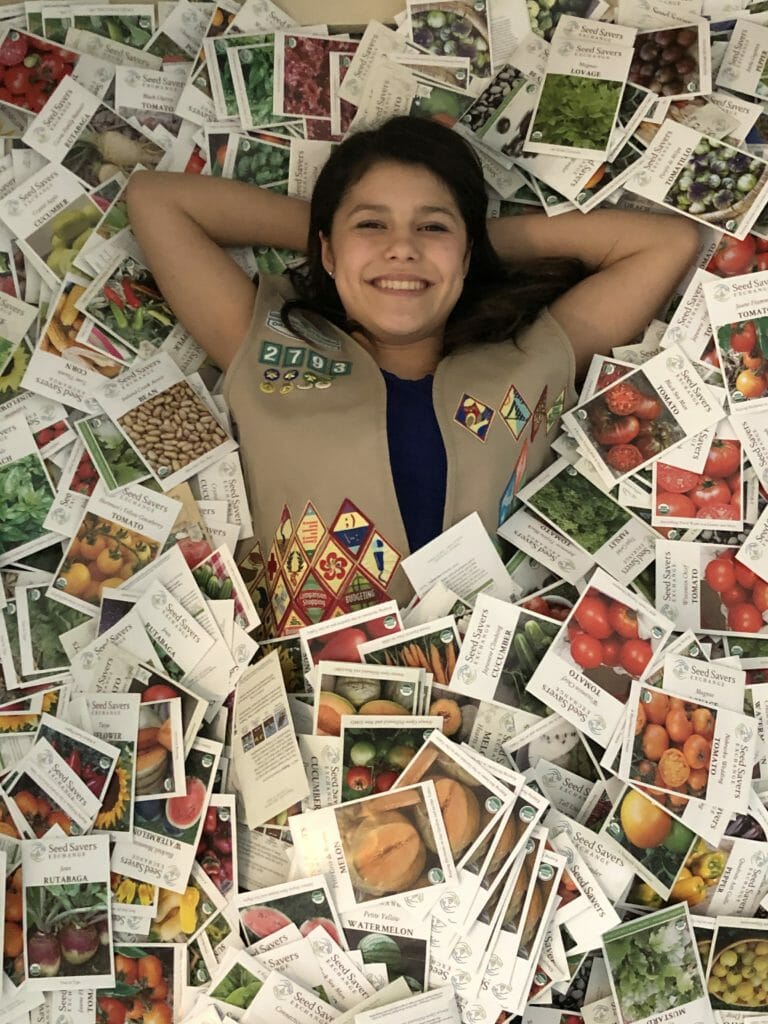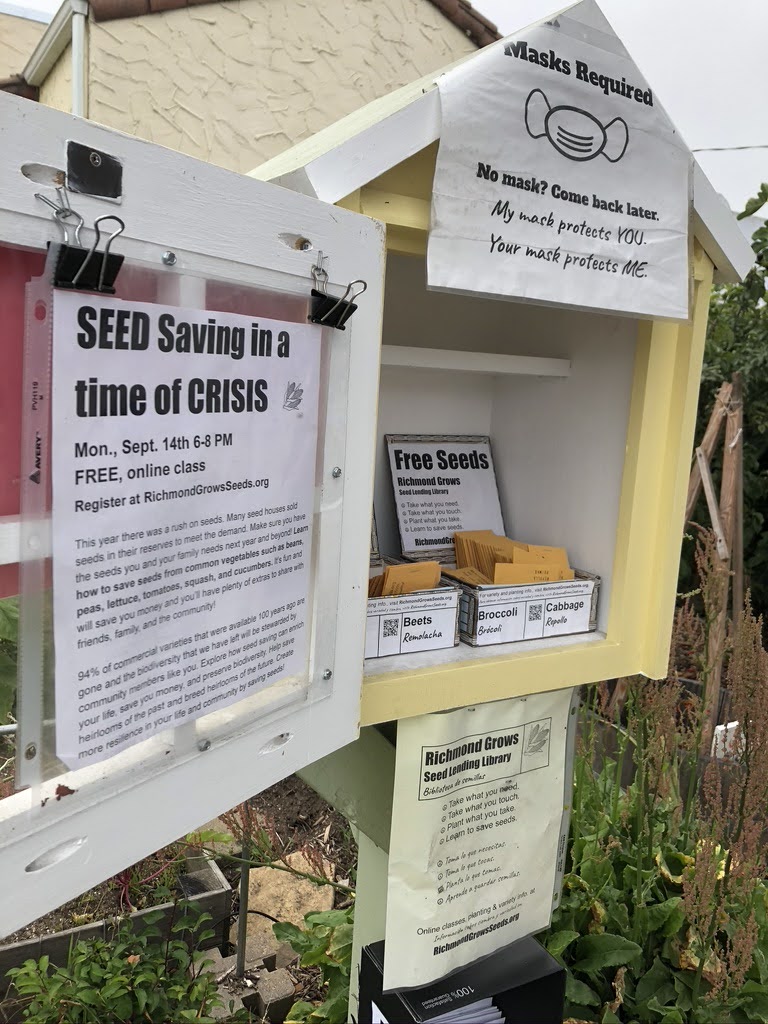This Teenager Helped Launch Seed Libraries in Every State
The popularity of seed libraries has soared during the pandemic.
This Teenager Helped Launch Seed Libraries in Every State
The popularity of seed libraries has soared during the pandemic.

Alicia Serratos has helped set up seed libraries in all 50 states.courtesy of Alicia Serratos
During the pandemic, Alicia Serratos has spent countless hours assembling kits containing organic vegetable, herb and flower seeds, envelopes and plant markers to help communities establish seed libraries.
Seed libraries maintain stocks of seeds that the public can “check out” to plant in their gardens. Boxes stocked with packets of seeds are often housed in public libraries, but businesses and homeowners have also started creating mini libraries in an effort to boost food gardening and seed saving while promoting food access and security.
“Seed libraries are so important because they teach people where their food comes from,” Serratos says. “It’s made me so happy that so many people are interested in growing food and having seed libraries.”
Serratos, who is just 14, came up with the idea to start 3 Sisters Seed Box in 2019. Her goal: Send out enough starter kits to have at least two seed libraries in all 50 states. It started out as a Girl Scout project and turned into a nationwide movement. Seed Savers Exchange donated heirloom seeds for the project and the Community Seed Network mapped all of the seed library locations. Since she started her campaign, requests have flooded in via social media from communities eager to start their own seed libraries.
The first 3 Sisters Seed Box was installed in Pennsylvania in April 2020 and the last, installed in Auburn, New Hampshire, was shipped in January 2021. To date, Serratos has shipped 108 seed library starter kits to communities nationwide.
Although seed libraries are not new—a librarian in New York established a seed library in 2004 and Serratos established seed libraries at three elementary schools near her home in Orange County, California, seven years ago—the concept has exploded during the pandemic.
“[The seed libraries] have expanded so much because people are gardening during quarantine,” Serratos says.
Seed libraries are free and open to the public, and no membership is required. Gardeners are encouraged to save seeds and contribute them to the library so others can access them. Not everyone who takes seeds will save them and add them, so “stewards”—who manage seed libraries—often purchase seeds or request donations from seed companies to keep the libraries stocked.
Even though many of the public libraries that operate them have been closed during the pandemic (and some seed companies are sold out of popular fruit and vegetable varieties), seed library organizers have remained committed to distributing seeds.
The seed libraries at the South Burlington Public Library in Vermont and the Henry County Public Library in Indiana offer curbside pickup options.

Rebecca Newburn, a co-founder of the Richmond Grows Seed Lending Library, created mini seed libraries all over Richmond, California, setting up boxes at supermarkets, bike shops and churches to ensure that the public was still able to access seeds for their food gardens.
“The public libraries closed, but the desire to grow food increased during the pandemic,” Newburn says. “We had to transform how we were providing seeds to be able to meet the demand.”
Since the start of the pandemic, Richmond Grows Seed Lending Library has given out 20,000 seed packets compared to “several thousand” packets that went out each year pre-COVID-19.
Serratos has also been working overtime to keep up with the demand for 3 Sisters Seed Box starter kits. In addition to sending kits to libraries, schools, senior centers and community centers, the teen has also shipped them to homeowners who want to install seed libraries in their neighborhoods to provide 24/7 access to passersby.
Serratos hopes that the interest in gardening and growing food helps spark conversations about food security, biodiversity and seed saving. “We eat every day and we need to spend a lot more time thinking about where our food comes from,” she says.
Follow us
This work is licensed under a Creative Commons Attribution-NoDerivatives 4.0 International License.
Want to republish a Modern Farmer story?
We are happy for Modern Farmer stories to be shared, and encourage you to republish our articles for your audience. When doing so, we ask that you follow these guidelines:
Please credit us and our writers
For the author byline, please use “Author Name, Modern Farmer.” At the top of our stories, if on the web, please include this text and link: “This story was originally published by Modern Farmer.”
Please make sure to include a link back to either our home page or the article URL.
At the bottom of the story, please include the following text:
“Modern Farmer is a nonprofit initiative dedicated to raising awareness and catalyzing action at the intersection of food, agriculture, and society. Read more at <link>Modern Farmer</link>.”
Use our widget
We’d like to be able to track our stories, so we ask that if you republish our content, you do so using our widget (located on the left hand side of the article). The HTML code has a built-in tracker that tells us the data and domain where the story was published, as well as view counts.
Check the image requirements
It’s your responsibility to confirm you're licensed to republish images in our articles. Some images, such as those from commercial providers, don't allow their images to be republished without permission or payment. Copyright terms are generally listed in the image caption and attribution. You are welcome to omit our images or substitute with your own. Charts and interactive graphics follow the same rules.
Don’t change too much. Or, ask us first.
Articles must be republished in their entirety. It’s okay to change references to time (“today” to “yesterday”) or location (“Iowa City, IA” to “here”). But please keep everything else the same.
If you feel strongly that a more material edit needs to be made, get in touch with us at [email protected]. We’re happy to discuss it with the original author, but we must have prior approval for changes before publication.
Special cases
Extracts. You may run the first few lines or paragraphs of the article and then say: “Read the full article at Modern Farmer” with a link back to the original article.
Quotes. You may quote authors provided you include a link back to the article URL.
Translations. These require writer approval. To inquire about translation of a Modern Farmer article, contact us at [email protected]
Signed consent / copyright release forms. These are not required, provided you are following these guidelines.
Print. Articles can be republished in print under these same rules, with the exception that you do not need to include the links.
Tag us
When sharing the story on social media, please tag us using the following: - Twitter (@ModFarm) - Facebook (@ModernFarmerMedia) - Instagram (@modfarm)
Use our content respectfully
Modern Farmer is a nonprofit and as such we share our content for free and in good faith in order to reach new audiences. Respectfully,
No selling ads against our stories. It’s okay to put our stories on pages with ads.
Don’t republish our material wholesale, or automatically; you need to select stories to be republished individually.
You have no rights to sell, license, syndicate, or otherwise represent yourself as the authorized owner of our material to any third parties. This means that you cannot actively publish or submit our work for syndication to third party platforms or apps like Apple News or Google News. We understand that publishers cannot fully control when certain third parties automatically summarize or crawl content from publishers’ own sites.
Keep in touch
We want to hear from you if you love Modern Farmer content, have a collaboration idea, or anything else to share. As a nonprofit outlet, we work in service of our community and are always open to comments, feedback, and ideas. Contact us at [email protected].by Jodi Helmer, Modern Farmer
February 8, 2021
Modern Farmer Weekly
Solutions Hub
Innovations, ideas and inspiration. Actionable solutions for a resilient food system.
ExploreShare With Us
We want to hear from Modern Farmer readers who have thoughtful commentary, actionable solutions, or helpful ideas to share.
SubmitNecessary cookies are absolutely essential for the website to function properly. This category only includes cookies that ensures basic functionalities and security features of the website. These cookies do not store any personal information.
Any cookies that may not be particularly necessary for the website to function and are used specifically to collect user personal data via analytics, ads, other embedded contents are termed as non-necessary cookies.
This wonderful young lady may be one of our future leaders. This retiree thinks she is fantastic for what she has already accomplished.
Fantastic idea. if anyone has extra hemp seeds that would allow us to plant, (and return to the library twice as many as we receive). We want to construct a large amount of HEMP plants that can help offset carbon emissions from industry and large businesses that need to buy carbon credits.
please contact us at 9487 Shea Road, LLC. rbeitscher@yahoo.com, 970-485-9901
Hi Modern Farmer, just letting you know that Facebook has blocked your content in Australia. I really wanted to share this good news story with my friends but I can’t.